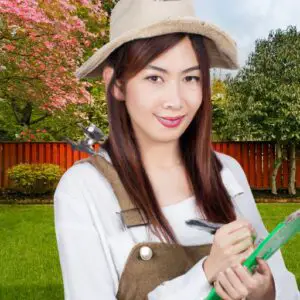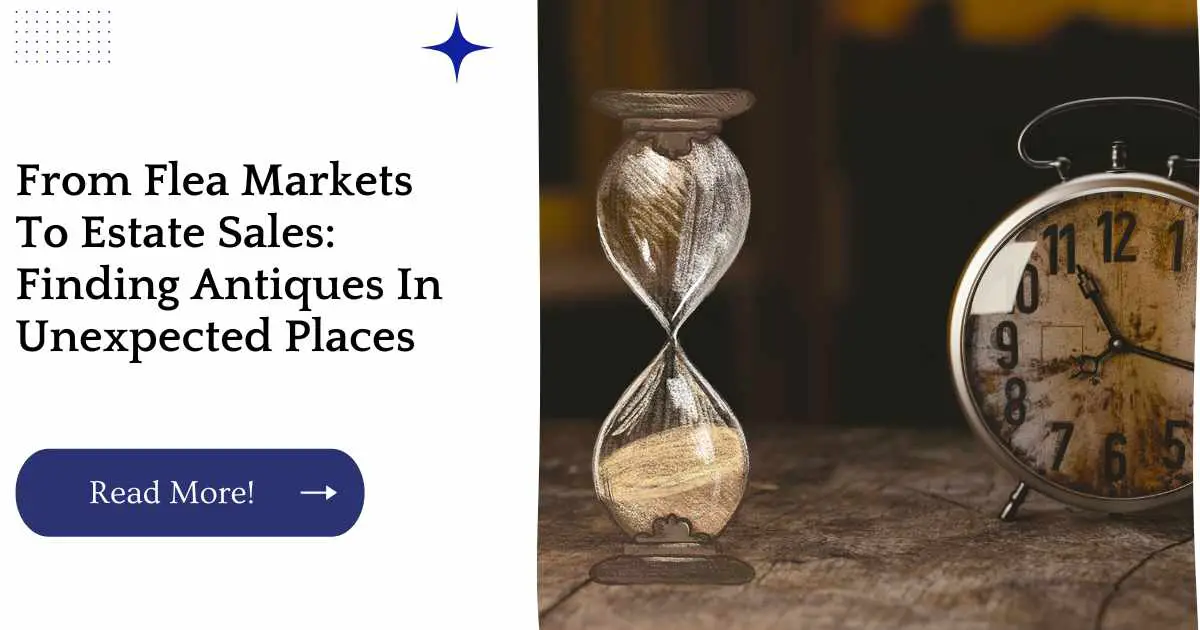If you’re like me and have a love for the past, then you’ll understand the allure of flea markets and estate sales.
These places are filled to the brim with antiques and other collectibles that can be had for a fraction of their original price.
| Takeaways |
|---|
| Antique hunting can be an exciting and rewarding experience. |
| There are many unexpected places to find valuable antiques, from flea markets to estate sales. |
| Antique restoration is an important way to preserve the past for future generations. |
| Doing your research and negotiating skills are important for getting the best deals on antiques. |
| Proper care and maintenance is essential for preserving the value and longevity of your antiques. |
If you’re anything like my friends and I who go to these places on a regular basis, then here are some helpful tips that will make your next visit even more enjoyable:
Parking Is Hard
Parking is often hard. You can’t always park close to the venue, and sometimes it’s expensive. You might have to walk a long way to get there.
When you’re looking for an antique or vintage item, it’s important to plan your route and find out about alternative parking options so that you don’t spend all day trying unsuccessfully to find a spot near the estate sale or flea market or wherever else is holding whatever treasure you’re seeking (and if they don’t have any posted info online, call them).
If possible, try parking at another location close by for example, nearby businesses that allow on-street parking and then walking over.
Alternatively, use public transportation if available; some parts of Los Angeles have street cars that go right past many of these venues! And lastly: if nothing else works out for you this time around… well then I guess it’s back home again JOB WELL DONE!
“If you’re new to antique hunting and not sure where to start, our beginner’s guide to antique hunting can help you get started. From where to look for antiques to tips on negotiating prices, this guide has everything you need to know to become an antique hunting pro.”
Go Early
Early birds get the best deals and the most competitive ones. If you’re looking for a specific item, it’s best to go early in order to avoid crowds and get first pick of what’s left on display. You’ll also have far more time to fondle the merchandise and decide if it’s worth your money.
If you’re not sure what kinds of things you want ahead of time, try and go on a weekday when people are less likely to be shopping at flea markets (or estate sales), or bring along a friend who can help keep an eye out while you browse through shelves and racks full of vintage items.
If scheduling issues prevent you from going early in the day, there are still ways to maximize your chances at finding something worthwhile: try going later in the afternoon/evening; this is usually when dealers start thinking about packing up their wares for another day or two until they return with fresh inventory!
Know Your Interests (Give Yourself A Goal)
There are plenty of people who don’t know what they’re looking for. That’s fine, but if you want to make the most out of your time and money, it’s good to know what you love and have an interest in.
For example: I am a big fan of mid-century modern furniture.
My grandfather loved collecting old items from estate sales, flea markets and auctions (he used to run an antique shop). He passed away recently so I decided that I would start collecting his antiques as well as my own pieces and hopefully pass them down someday too!
Once you have an idea about what interests you most when it comes to antiques or vintage goods, use those interests as a guidepost they’ll help direct your search while also inspiring new ideas along the way.
And remember that there are no rules here; everyone has different tastes so if something doesn’t work out initially then try another approach!
“The thrill of finding a hidden gem at an estate sale or flea market is unlike any other. Our stories of incredible antique discoveries will inspire you to keep searching for that one-of-a-kind antique that you never knew you needed.”
Be Patient
Be patient. This is the one thing that you should keep in mind when you are out looking for antiques. You need to understand that some of these things take time, especially if you are trying to find something unique or rare.
Don’t rush into anything or make any quick decisions about a product based on its price or appearance only.
If you see something that interests you and seems like it might be worth buying, then take your time and look over everything carefully before making any final decisions about buying it or not buying it!
Ask Questions
When you’re looking for antiques to buy, it can be helpful to ask the seller some questions.
Ask how long they’ve had the item. If they’ve owned it for a while, they may be willing to lower their price or make a deal with you in order to get rid of it quickly.
Ask about its history and the best way to clean it up if necessary; then check with other experts before doing any work yourself! Sometimes people don’t know what they have until someone points out its value or importance—don’t be afraid of asking lots of questions!
Always Bargain
- Being open to the idea of bargaining is part of the fun.
- Know your budget before you go. If a price seems too high, be prepared to walk away.
- Ask for a discount or negotiate a lower price if it’s something that really appeals to you (like an old family heirloom).
- Don’t feel pressured into making a snap decision—if you need more time to think about it, ask for more time!
“Antique restoration is not just about fixing a broken item; it’s about preserving the past for future generations. Our guide on antique restoration explores the importance of antique restoration and offers tips on how to do it properly.”
Don’t Panic If There’s Not Much To Choose From.
Sometimes, you’ll show up at an antique sale and be met with a sea of antiques. Other times, you may only find one or two things that interest you. Don’t panic! There’s still plenty to do there and it can be a great time either way.
If the vendor has no idea what the item is or how old it is (or even where they got it), ask if they know more about its history. If they don’t seem to have any answers, try saying something like, “I’d love to get this piece back into the hands of someone who appreciates it.” Sometimes this will make them think twice about selling their wares on Craigslist later on down the road in order to buy groceries instead.
Do Your Research Before You Go
Before you head out to an estate sale, flea market or other place where you might find antiques, do some research. Look up the average prices of similar items in your area and if possible, compare these with prices in other areas as well.
If there’s a good online database for identifying fakes and forgeries, use that too. You’ll also want to know the value of whatever particular piece(s) you’re looking for; whether it’s timepieces or vintage kitchenware or something else entirely!
If possible, have an idea about what kind of value you expect your item(s) to have before heading out on your shopping adventure so that when they sell them (and they almost certainly will), they won’t seem like such a steal compared with what other vendors are charging elsewhere nearby (or even further away).
“Finding hidden treasures on your antique hunting adventures can be a challenge, but it’s not impossible. Our 10 tips for finding hidden treasures will give you the knowledge and skills you need to uncover those rare and valuable finds.”
Be Patient, Focus On What Rules You Have And Be Smart About It.
Flea markets, estate sales and garage sales can be found in nearly every town across the country. The rules for purchasing are different at each venue.
Be patient and take time to look through all of the items that are available before making a purchase decision. Don’t just buy something because it’s cheap and easy (you might regret it later). Be sure that you love everything about it!
Know what you can afford to pay for an item before you start looking at prices on anything else. If you see something great but don’t know if your budget will allow for it, move on until another opportunity presents itself where money is not an issue.
Remember: There are no guarantees when dealing with antiques, but if you follow these tips above and stay smart about your purchases, there’s no reason why anyone shouldn’t be able to find some great deals from flea markets or estate sales!
“Every antique has a story to tell, and our guide to the fascinating history behind your antique finds will help you uncover the secrets behind your favorite pieces. From the origins of a particular style to the history of the item’s previous owners, this guide will help you appreciate the unique story behind every antique.”
Conclusion
Think of antiques as a hobby or an investment. It’s always fun to buy something you like, but it’s even more exciting when it becomes valuable over time. Remember that there are many ways to find antiques and flea markets can be one of them!
Further Reading
Here are some additional resources to help you find antiques in unexpected places:
Finding Valuables in the Most Unusual Places: This article explores some unique places where you might find valuable antiques, such as thrift stores, yard sales, and even dumpsters.
Valuable Antiques You Might Have In Your Home: This article highlights some of the most valuable antiques that might be hiding in your home, from vintage jewelry to old coins.
FAQs
What are some unusual places to find antiques?
Some unusual places to find antiques include thrift stores, yard sales, estate sales, and even dumpsters.
How can I determine the value of an antique?
The value of an antique can depend on a variety of factors, including its rarity, condition, and historical significance. You can consult with an appraiser or do some research online to get an idea of how much your antique might be worth.
What are some tips for negotiating the price of an antique?
Some tips for negotiating the price of an antique include doing your research beforehand, being respectful and polite, and offering to pay in cash.
How can I tell if an antique is authentic?
Authenticating an antique can be a complex process, and often requires the help of a professional appraiser or antique dealer. Some signs of authenticity to look for include signs of age, quality of craftsmanship, and historical documentation.
How should I care for my antiques?
Proper care and maintenance is important for preserving the value and longevity of your antiques. Some tips for caring for antiques include storing them in a cool, dry place away from direct sunlight, avoiding harsh cleaning chemicals, and handling them with care.

Hi there! My name is Hellen James, and I’m here to talk to you about treasure hunting. I’ve been a fan of treasure hunting ever since I was a kid, and if you’re a fan of treasure hunting or just like the idea of finding a long-lost fortune, then this blog is for you.

